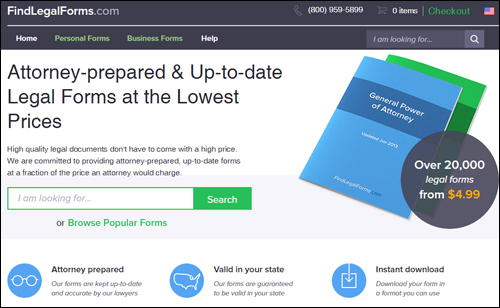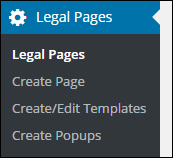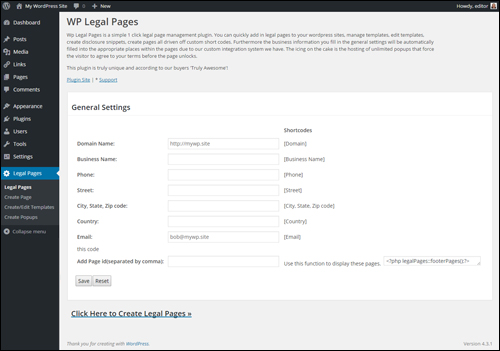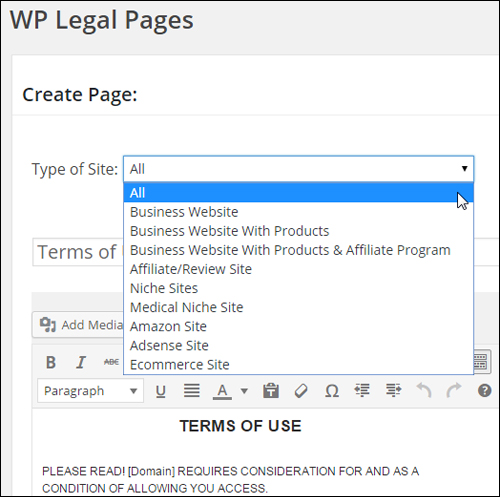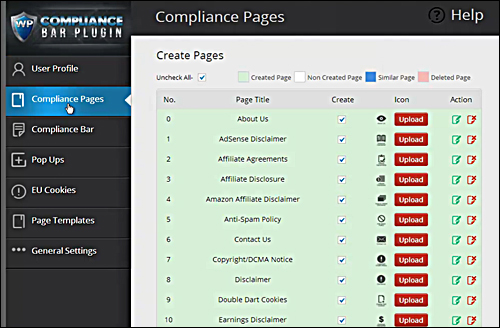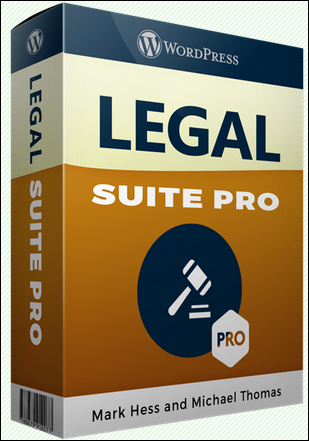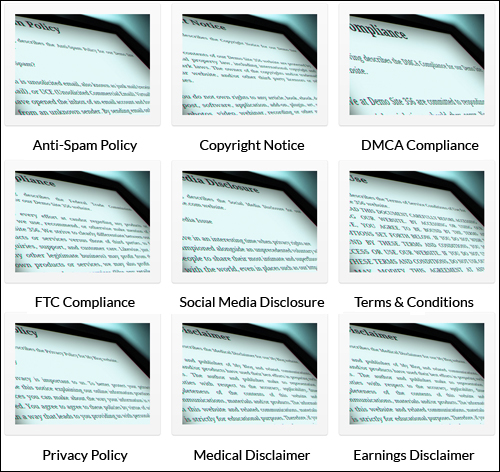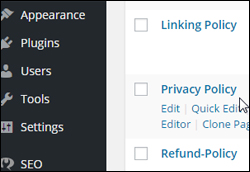
If you do any kind of business online, the last thing you want is to find yourself on the wrong side of the law.
Internet laws were designed to protect consumers and apply to anyone who markets, sells or promotes goods or services online. Anyone who owns a website risks being sued for not following compliance laws. Feigning ignorance about legal requirements will not excuse you from being slapped with a legal notice.
Recent laws introduced in 2014 to regulate how businesses promote advertising on their websites state that if you promote anything on your site for material gain, then you must follow certain disclosure guidelines to prevent enforceable orders being issued against you by consumer protection departments, such as the (US based) BBB, or Better Business Bureau. Look up “The Online Interest-Based Advertising Accountability Program,” which regulates behavioral advertising across the internet for more details.
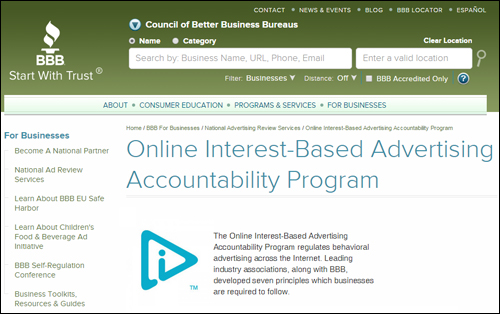
(Online Interest-Based Advertising Accountability Program – Better Business Bureau)
The new laws affect several online business activities, including:
- Any type of advertising, like display advertising
- Retarget Marketing
- Google Analytics (or other analytics software)
- Affiliate Marketing
- Product Creation
- Bloggers
- etc.
If your site does not display certain legal pages (e.g. terms and conditions of use, privacy policy, earning disclaimers, etc.), many third-party sites like Google won’t let you advertise, digital marketplaces like ClickBank or JVZoo won’t allow you to sell digital products, PayPal may shut down your account and withhold payment of your funds, Facebook will disapprove your applications, and you will not be allowed to enroll in a number of advertising or online merchant networks.
If your business online is not in compliance, you could also face a multitude of penalties, including fines, having your website shut down, even jail time!
In this guide, we look at why it’s important to have a compliant website and how to quickly and easily add all necessary legal pages to your WordPress website using simple methods and resources.

Is Your Website Legally Compliant?
![]()
Disclaimer: Please note that we are not lawyers and we do not offer legal advice in this article. As previously stated, this article is designed only to help make you aware that your website may be subject to a number of legal requirements in accordance with the laws governing online business practices and that you may be required to comply with the terms of service of companies whose services or products you advertise
The Importance Of Making Your Website Compliant
Consider what could happen to your business in the following scenarios:
- A user has a cardiac arrest after they use your online workout program.
- The skin care lotion you promote as an affiliate gives someone who purchases from your link an allergic reaction.
- Your opt-in list provides a statement informing subscribers that you won’t sell their information, but you haven’t clearly spelled out what you’ll do with their details.
- Someone steals content from your website and publishes it on their site.
- There is no statement on your website making your site users aware that you are endorsing a product as an affiliate and will receive financial benefits if they purchase through your affiliate link.
- You didn’t spell out the conditions of your refund policies.
- Visitors claim that the testimonials on your site are false and decide to sue you because of it.
- You have not disclosed that you were given a free copy in your product review.
- Your site publishes adult content and you have not taken sufficient measures to keep underaged children from accessing it.
Consider now the following actual examples of costly compliance breaches:
- A CPA Marketer failed to provide adequate disclaimers telling visitors they would have to give up their personal information (including credit card details to complete his offer. In addition to a significant $390,000 fine, he is now required to provide everyone he does business with for the next 20 years, a copy of the judgement — including employees.
- A social networking app developer copped a massive $800,000 fine for collecting personal information without users’ knowledge and consent – including storing children’s private details.
- Facebook’s Terms Of Service prohibits users from scraping Users IDs. Many internet marketers gambled that they could get away with it and lost. Their accounts were shut down, costing them thousands of dollars in lost revenue.
- An independently-conducted 2010 study by Brad Geddes of SearchEngineLand, showed that, of a couple of hundred randomly-chosen websites, more than 90% had breached at least one of Google’s policies, more than 65% had broken at least two of Google’s policies, and more than 40% had broken at least three of Google’s policies. Although the website owners could technically be sued by Google, more than likely what could happen, is that they would be issued cautions or lose access to the Google program whose policies they had violated, which could result in loss of income (e.g. AdSense or AdWords).
Can you see how easy it is to risk being a target of litigation?
Regardless of whether you are a:
- CPA or PPA Marketer
- Network Marketer
- Affiliate Product Promoter
- AdSense Publisher
- Product Marketer
- Amazon Affiliate
- EBay Seller
- Publisher Of Adult Content
- Freelancer, Coach or Consultant
- Seller Of Any Product Or Service Online
It’s vitally important to do whatever is necessary to make sure that your website or blog remains fully compliant with the law.
Complying With Third-Party Companies Terms And Policies
Complying with 3rd-party services terms and policies is important.
You are expected to let your visitors know that your website complies with legal requirements and recommended guidelines. This not only improves trust and confidence in your business, it’s also required in many cases by most companies you interact with online.
Let’s take a look at some examples:
Google requires your site to display legal information if using their products or features. This includes Google Analytics …
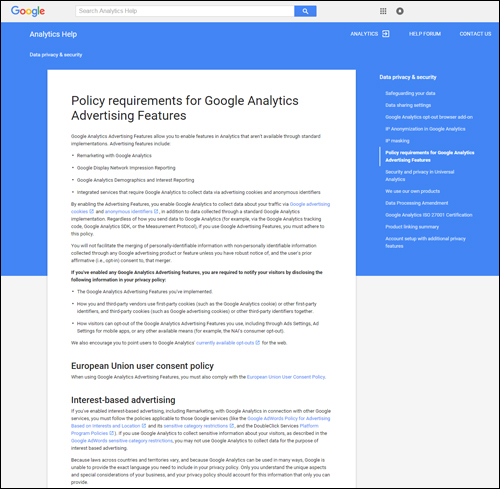
(Google Analytics – Policy Requirements)
Making money online with your blog with Google AdSense display advertising …
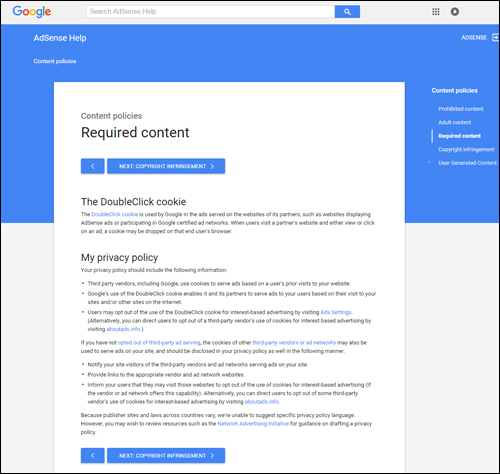
(Google AdSense ads - policy requirements)
Or promoting your business via Google AdWords …
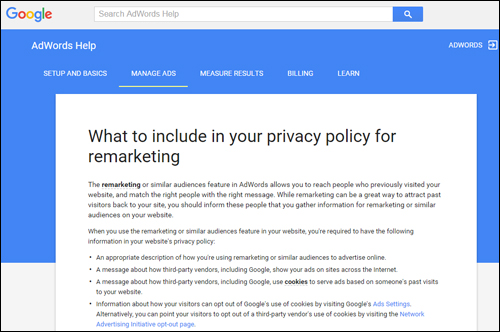
(Policy requirements for using Google AdWords)
If you sell information-based products via places such as ClickBank, JVZoo, or other established merchant sites, you will need to add various legal pages to your website before they will approve your products for sale in their network …
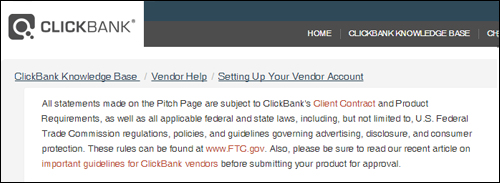
(Policy requirements for ClickBank digital product vendors)
The FTC (Federal Trade Commission) also requires you to display clear disclaimers and statements to visitors, especially if you plan to use testimonials or product endorsements …
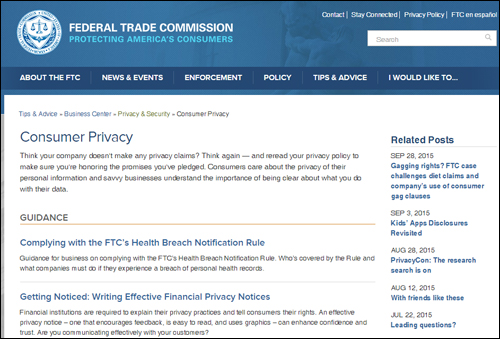
(FTC – consumer guidelines and regulations)
FTC Regulations Require Your Site To Be Compliant
New FTC regulations governing how business is conducted online were introduced in March 2012. A quick search online will reveal that many business are still unaware (or choose to flaunt) these requirements. As documented on their website, this typically ends up with the FTC making an example of businesses and prosecuting companies for breaches of regulation in an effort to get other businesses to comply.
If you do any type of business online, therefore, it’s best not to take any chances. Even if your business does not operate in the U.S. you should protect your business interests by making sure that your site complies with all FTC regulations and guidelines.
You can find many sites that can provide guidelines and examples for structuring disclaimers and disclosures to help you comply with FTC requirements. We provide additional references at the end of this article …
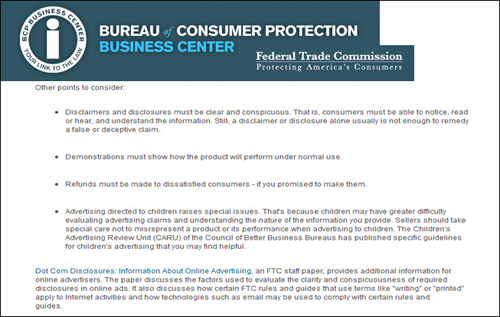
(Structuring your disclaimers and disclosures correctly is important to avoid running foul of laws and regulations)
Don’t Forget Social Media Applications
If you plan to create apps that integrate with your site, social networking sites like Twitter, Facebook, and many others require you to provide access to your legal pages …
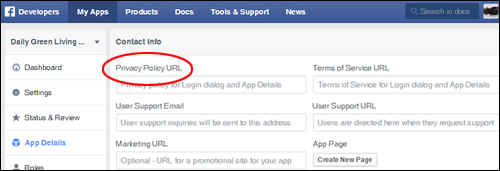
(Apps that integrate with social networks also require compliance)
![]()
- If you are unsure as to whether or not you may be breaking the law, and/or Terms of Service policies and guidelines of websites like Google, Facebook, etc., it’s best to assume that you most probably are.
- If you plan to promote services or products on your site via affiliate marketing, or making money online with Google AdSense, eBay or Amazon ads, or driving visitors to your website with Google AdWords, etc., then find out exactly what kind of legal information you are required to include on your site to comply with their Terms Of Service and policy requirements - don’t risk having your accounts shut down.
- If you have ever wondered if “borrowing” a Copyright Notice is Copyright infringement, then it’s best to take proper precautions to protect yourself and your business interests.
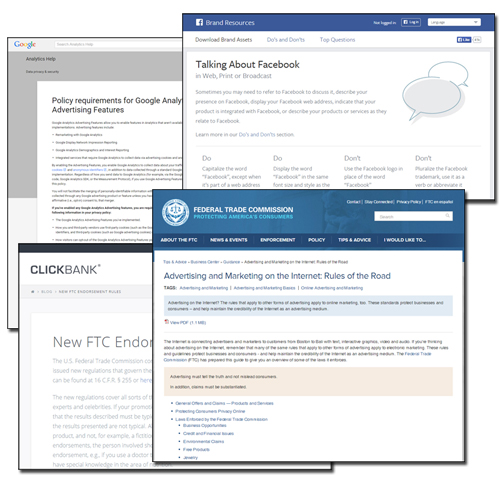
(In addition to legal and regulatory compliance, most third-party websites require you to comply with their terms of use)
What Legal Information Should I Add To My Website To Be Legally Compliant?
If you suspect that your website or blog lacks in areas of compliance, then this section will help you.
At its most basic, adding the following compliance pages to your website will keep your business out of trouble with many consumer protection agencies and 3rd-party providers, and avoid possible legal issues or even threats of legal action (e.g. “take down” notices):
- About Us Page
- Contact Page
- Privacy Policy
- Terms Of Use
- Website Disclaimer
- General Data Protection Regulation (GDPR) Compliance
As well as the above, you may want to consider adding any of the following pages:
- Affiliate Disclosure (e.g. if you provide information about affiliate products and services)
- Anti-Spam Policy
- Earnings Disclaimer
- External Linking Policy
- Health Disclaimers (if your website provides advice about health or medical areas)
- Refund Policy (if you run an e-commerce site)
- Audio/Video Terms Of Use (e.g. if you allow users to download media on your site)
Types Of Disclosure Pages
It’s important to add the right disclosures to your website. For example:
- No Material Connection – Discloses to visitors that you’re not receiving any form of compensation for writing the post.
- Affiliate Links – Lets users be aware that you may benefit financially if they purchase through your affiliate link.
- Review/Sample Copy – Lets users be aware that you have received a sample or review copy of the product you’re reviewing or writing about by the author or product developer.
- Sponsored Post – Lets your visitors be aware that you have been compensated in some form to write the article.
- Third Party Advertising – Informs visitors that you’re using online behavioral tracking technology. This is required to satisfy the “enhanced notice” the Better Business Bureau has been requiring online publishers to show prominently on their sites since January 1, 2014.
How To Add Legal Pages To Your WordPress Website
Ideally, you should consult a lawyer or a legal firm and ask them to prepare the verbiage of your legal documents. Once you have this done, there are several ways to add them to your website.
Uploading Legal Pages Manually
If someone prepares and delivers the legal verbiage for you in HTML format, you can simply upload these to your server, or have someone upload these pages for you.
We recommend creating a legal directory on your web server and uploading HTML pages containing your legal documentation to this directory using FTP …
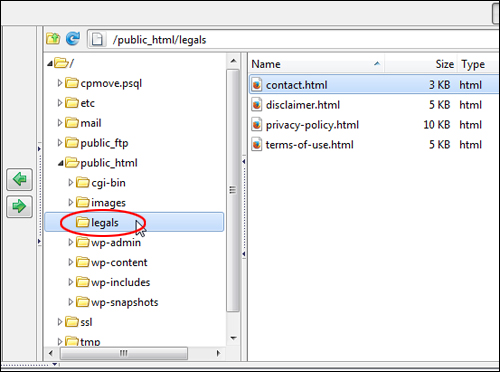
(Upload legal pages to your web server using FTP)
You can then easily add links to these pages in WordPress using custom links in your menu admin area …
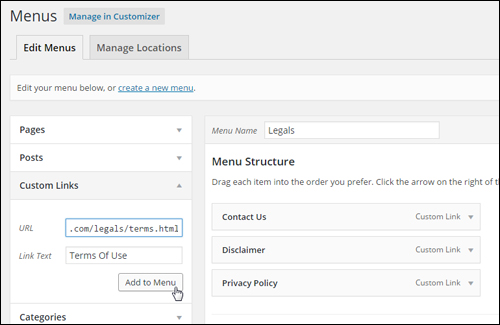
(WordPress Menu)
Where To Display Legal Web Pages On Your Site
After uploading your legal pages, make sure that these are up-to-date and clearly visible to visitors. You can add these to your sidebar (or the footer of your website or blog) to ensure that users have access to legal information from all your pages …
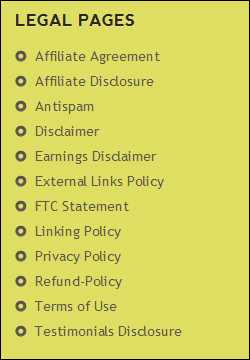
(Display links to legal information on all of your site’s pages)
We have created a detailed tutorial about displaying links to pages on your sidebar or footer menu using widgets here:
Store-Bought Legal Templates
You can easily find downloadable attorney-drafted disclosures and internet forms and agreements by searching online, or by visiting sites like the ones listed below:
Find Legal Forms
(Find Legal Forms)
For more information, go here:
Alternatively, you can purchase a set of legal templates designed by legal attorney Scott Talbert …
Cut & Paste Website Legal Pages
(Cut & Paste Website Legal Pages)
Cut & Paste website templates feature less passive voice and more plain language phrasing and can be easily customized with a simple quick search and replace to add your own business name and URL, then pasted into your pages.
The legal templates included in Scott Talbert’s Website Legal Form Templates include:
- Anti-Spam Policy
- Copyright Notice
- Disclaimer
- DMCA Compliance
- Federal Trade Commission Compliance (This proprietary FTC page reflects FTC regulations and guidelines brought into effect in 2012)
- Privacy Policy
- ToS & Conditions of Use.
You can either create a new page on your website for every legal form you want to add to your site, then paste the content from the templates into your pages and publish or upload these to your web server as previously described.
For more details, go here:
Legal Pages – WordPress Plugins
As well as using cut & paste legal templates, another option for adding legal pages to your website is to use WordPress plugins.
Here are some great plugins for WordPress-driven websites worth looking into:
WP Legal Pages Plugin
(WordPress Plugin – WordPress Legal Pages)
If the idea of creating legal pages manually feels too time-consuming for you, then consider using a plugin like WordPress Legal Pages …
This is not a free plugin, but it’s a very affordable and well-supported plugin that will help make the work of creating and implementing legal pages on your site a lot easier and save you a great deal of time and effort.
Some of the benefits of using the WordPress Legal Pages are:
- Pre-written Templates – Includes over 20 built-in legal page templates created by a team of professional lawyers.
- Quick And Easy To Use – You can set up most of the legal pages you need in around 3 minutes with a few clicks of the mouse.
- Customizable Pages – Includes customizable and editable legal form templates (e.g. Terms Of Service, Disclaimer, Earnings Disclaimer, Privacy Policy and more!)
- Easy To Edit Pages – Full WYSIWYG editor lets you edit legal pages like any WordPress page.
- Custom Shortcodes – Add shortcodes to any of your WordPress pages and the information will be automatically inserted into your pages when you publish.
- Exclude pages. The plugin lets you exclude pages from menus with a simple checkbox and delete and manage these like any other page on your website.
- Forced Options – Force page lockdown. When a user agrees to the legal terms, the page unlocks, giving them access.
- Additional Features – New plugin features get added when new versions are released.
After installing WordPress Legal Pages, a new menu item will appear inside your main navigation menu section …
(WP Legal Pages Plugin – Menu)
This lets you view, create and edit your legal pages from your admin area …
(WordPress Legal Pages – Settings Screen)
The plugin gives you the option of creating legal pages for different online uses, such as business websites with products, review websites, Amazon sites, etc …
(WP Legal Pages Plugin For WordPress – Create different legal pages)
Choose from various built-in legal templates …
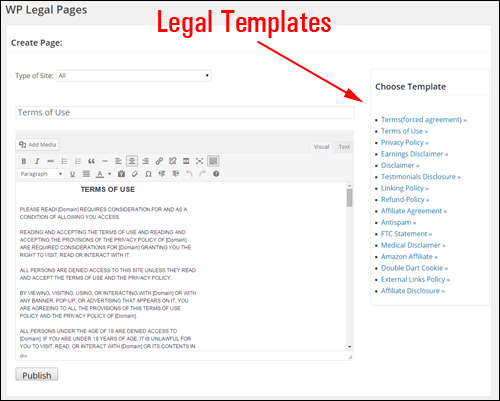
(WP Legal Pages Plugin For WordPress – Pre-configured Templates)
Legal page templates include:
- Terms of Use (Users are forced to agree to Terms and Conditions before using site)
- Linking Policy
- External Links Policy
- Terms and Conditions
- Refund Policy
- Affiliate Disclosure
- Privacy Policy
- Affiliate Agreement
- Facebook Privacy Policy
- Earnings Disclaimer
- Antispam Policy
- DoubleClick DART Cookies Policy
- Disclaimer Template
- FTC Disclosure Statement Template
- Medical Disclaimer Template
- Testimonials Disclosure – As per FTC guidelines
- Amazon Affiliate Disclosure Template
- DMCA Policy Template
- California Privacy Rights Policy Template
- Digital Goods Refund Policy Template
- COPPA – Children’s Online Privacy Policy Template
- Blog Comments Policy Template
- Newsletter Subscription Policy and Disclaimer Template
- FTC Disclaimer Widget
To learn more about this WordPress plugin, go here:
Compliance Bar – WP Compliance Plugin
Compliance Bar is a complete compliance & disclaimer solution for your online business …
For an in-depth review of this plugin go here:
Legal Suite Pro
(Legal Suite Pro Plugin)
Legal Suite Pro Plugin For WordPress lets you easily install professionally-written legal pages such as:
- Anti-Spam Policy
- Copyright Notice
- DMCA Compliance
- FTC Compliance
- Privacy Policy
- Social Media Disclosure
- Medical Disclaimer
- Terms of Service
- Earnings Disclaimer
(Legal Suite Pro – Professionally-written legal forms)
Additionally:
- Drag & Drop FTC Disclaimer Widget: Add an FTC Disclaimer to any WordPress sidebar or widget area.
- Customizable EU Cookie Compliance Bar: Display an EU cookie compliance bar if you are getting traffic from the EU and your sites use cookies.
With just one-click you can install almost all of the legal pages your site needs and these professionally written legal pages can be created in your theme and/or as a standalone page outside of your theme.
The plugin developers have packaged high quality, professionally written legal disclaimers into a plugin that can be installed quickly on any WordPress powered site. Your legal pages can be installed and set up on your site in one minute or less and the license allows you to install and use this plugin on all of your websites (even sites that you decide to sell or flip).
For more details, visit this website:
![]()
If hiring legal experts to create your legal pages is out of your budget, consider implementing at least some basic type of legal protection on your site until you can afford professional assistance.
We want your website to be legally safe!
Download the FREE Legal Pages Generator software below, or consider using one of the better solutions we discuss in this article, such as using attorney-written legal documents, or a plugin as described in the section below.

(Legal Pages Generator)
Legal Pages Generator Software lets you quickly generate essential legal documents for your website including Terms of Service, Privacy Policy, Copyright Notice, Website Disclaimer and optional Earnings Disclaimer.
***
As we’ve previously pointed out, if you do any type of business online, it’s important that your site complies with legal requirements of government agencies that regulate how business online is done and any terms of service and guidelines required by third-party sites that you may decide to promote or sell online. If your website isn’t compliant with laws intended to protect consumer rights, you’re breaking the law.
Non-compliance puts you at risk of suffering both financial losses and the loss of your reputation. Why risk your money and reputation, when you can protect yourself so inexpensively?
![]()
Disclaimer: Once again, please note that we are not lawyers and we offer no legal advice in this article. Do your own due diligence and consult a legal expert to ensure that your website is compliant with the law regarding your specific business.
Additional Legal Information
Below is a time-saving list of additional sites we recommend you visit to help you better understand what your business requires to comply and meet its legal obligations:
- Federal Trade Commission Latest List Of Rules & Regulations
- Federal Trade Commission Advertising & Marketing Rules Of the Road
- FTC Advertising And Marketing On The Internet
- Online Interest-Based Advertising Accountability Program
- Dot Com Disclosures: Information About Online Advertising
- Restore Online Shoppers’ Confidence Act
- CAN-SPAM Act Guide
- Children’s Online Privacy Protection Rule
- FTC Regulatory Review Web Page
- FTC Rules and Guides Currently Under Review
- The Department of Commerce Internet Policy Task Force – Commercial Data Privacy and Innovation in the Internet Economy: A Dynamic Policy Framework
- FTC Staff Report: Self-Regulatory Principles for Online Behavioral Advertising
- FTC Final Guides Governing Endorsements and Testimonials
- United States Patent and Trademark Office
- United States Copyright Office
Plus …
- Analytics Help – Policy requirements for Google Analytics Advertising Features
- Google AdSense Program Policies Explained
- AdSense Help – Required Content
- Google AdWords – Information Collection And Use
- AdWords Help – What to include in your privacy policy for remarketing
- ClickBank – Creating Your First Product
- Facebook Platform Policies
We hope this article has helped you understand the importance of having a legally compliant website. Use the information presented above to quickly add all necessary legal pages to your website.
***
"This is AMAZING! I had learnt about how to use WordPress previously, but this covers absolutely everything and more!! Incredible value! Thank you!" - Monique, Warrior Forum
